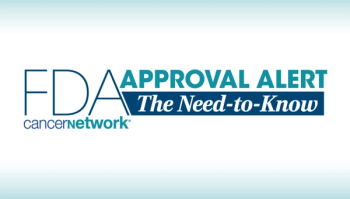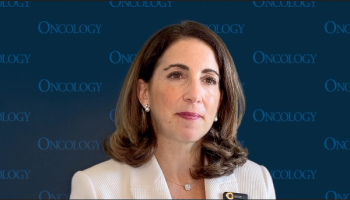
Results from the phase 1/2 AUGMENT-101 trial support the FDA’s decision for approving revumenib in this NPM1-mutated, relapsed/refractory AML population.

Your AI-Trained Oncology Knowledge Connection!


Results from the phase 1/2 AUGMENT-101 trial support the FDA’s decision for approving revumenib in this NPM1-mutated, relapsed/refractory AML population.

For patients with NRG1+ cholangiocarcinoma, zenocutuzumab may be a therapy option, according to results from the phase 2 eNRGY trial.

Read about recent advancements in breast cancer treatment, including new therapies and survival data, showcased at the upcoming ESMO 2025 Congress.

A new partnership agreement involving AI use may help spread radiotherapeutic standards from academic centers to more patients in community-based practices.

The evaluation of MT-125’s safety and preliminary activity in glioblastoma is underway in a phase 1/2 trial.

Belantamab mafodotin has been approved for multiple myeloma, despite the FDA’s ODAC voting against the treatment due to ocular toxicities.

The FDA has set a Prescription Drug User Fee Act date of June 18, 2026, for approving this formulation of nilotinib in chronic myeloid leukemia.

Adam Friedman, MD, FAAD, discusses essential communication strategies for oncologists to address patient fears about dermatologic adverse effects.

Data from the phase 3 ROADS trial show significant gains in efficacy without increases in safety concerns following the use of GammaTile.

Investigators are currently assessing the antibody-drug conjugate HDP-101 as part of a phase 1/2a study.

Sacituzumab govitecan plus pembrolizumab reduced symptom burden and improved functioning across multiple domains in the KEYNOTE-D19 study.

Exa-cel displayed MCID-exceeding, sustained mean changes from baseline across various HRQOL-related scores in transfusion-dependent β-thalassemia.

In areas that have a higher incidence of genetic conditions, experts across different fields have to collaborate to develop cures and therapies.

Recent findings presented at ASTRO 2025 suggest an “exciting opportunity” to expand the role of radiation oncology in different nonmalignant indications.

Patients with full-thickness or outer full-thickness stromal invasion following surgery had improved PFS when treated with SIB radiotherapy.

Enfortumab vedotin plus pembrolizumab before and after surgery improved EFS vs surgery alone in patients with MIBC in the phase 3 EV-303 trial.

The 3 most likely directions of radiotherapy advancements come from new technology, combinations with immunotherapy, and the incorporation of particle therapy.

Approximately half of the patients who received raludotatug deruxtecan in the phase 2/3 REJOICE-Ovarian01 trial achieved an objective response.

Talent shortages in the manufacturing and administration of cellular therapies are problems that must be addressed at the level of each country.

Third-year fellows from Weill Cornell Medicine offer 7 key tips for establishing a foundational understanding of the field at major oncology meetings.

The agency has set a PDUFA date of April 10, 2026, for the decision on RP1 plus nivolumab in patients with previously treated advanced melanoma.

Administering oral SERD-based regimens may enhance patients’ quality of life when undergoing treatment for ER-positive, HER2-negative breast cancer.

The BURAN trial revealed no overall survival benefit for buparlisib and paclitaxel in recurrent head and neck cancer, despite some response rate improvements.

Distance and training represent 2 major obstacles to making radiotherapy available to more patients with cancer across the world.
![Point-of-care manufacturing, scalable manufacturing, and bringing the cost down [can help].](https://cdn.sanity.io/images/0vv8moc6/cancernetwork/55a279b707f0cd71181a5efa8b3d3cd864555701-3002x1684.png?w=350&fit=crop&auto=format)
Those with cancer may be able to get cellular therapies more affordably if countries and health systems adopt decentralized closed-system manufacturing.

With a median follow-up of 50.1 months, nivolumab plus ipilimumab achieved a median PFS of not reached compared with 60.8 months with nivolumab monotherapy in this CRC population.

The overall survival benefit with the bemarituzumab combination in the phase 3 FORTITUDE-101 trial was consistent across key prespecified subgroups.

The confirmed ORR in the investigational arm was 52.3% vs 46.6% in the chemotherapy arm, with respective complete response rates of 10.9% and 8.5%.

Louis Potters, MD, FASTRO, FABS, FACR, describes how evidence-based radiation protocols may integrate with novel artificial intelligence software.

Alectinib exhibited a CNS DFS improvement, with a 63% reduction in the risk of this event, and 4-year CNS DFS rate was 90.4% vs 76.1% with chemotherapy.